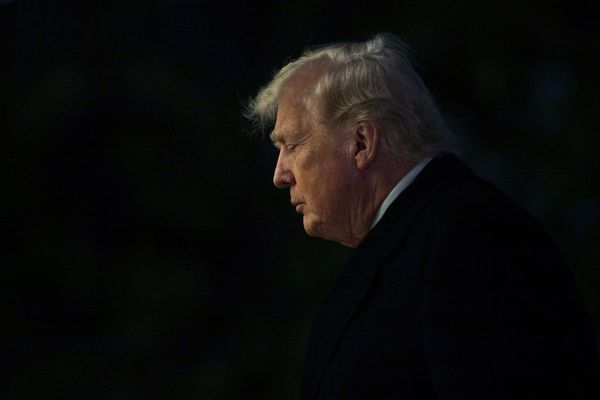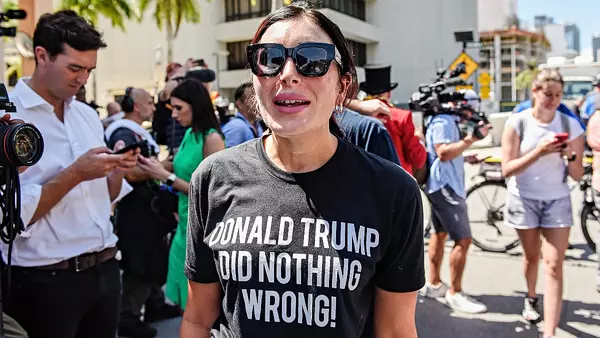
Harris said the United States would in response “deepen our unofficial ties" to the disputed island that China views as part of its territory.
The escalating tensions over Taiwan have raised the potential for conflict in an already volatile corner of the globe. But the core of U.S. plans for deterring or confronting China depends on alliances that are under strain.
Despite renewed efforts at reconciliation, South Korea and Japan, which Harris referred to as the "linchpin" and "cornerstone" of American strategy in Asia, continue to be at odds with one another and torn apart by the effects of World War II.
The United States is prodding both sides to compromise as it tries to refocus its alliances to counter China's growing strength.
The state funeral for former Japanese Prime Minister Shinzo Abe served as the focal point of Harris' four-day visit to the area. She told reporters that she sees American foreign policy in the area "in the context of a trilateral relationship," with the U.S., Japan, and South Korea cooperating.
A senior administration official, speaking on the condition of anonymity to discuss private conversations, said Harris encouraged the South Korean and Japanese leaders to advance their negotiations during her meetings with them.
The U.S. wants “to see two of our closest allies in the world working even better with each other," and “we’re gratified to see that both countries seem determined to address those issues with a real vigor," the official said.
However, the official said the U.S. had a limited role to play.
“It’s not for us to mediate or negotiate or broker what that relationship should look like," the official said.
Point of contention between Japan and South Korea
Years before the conflict started, Japan colonised the Korean Peninsula and forced many people into forced labour and women into sexual slavery. Despite the passage of time, tensions still surface in discussions of trade, technology, and intelligence sharing.
Although efforts are being made to mend their relationship, progress is still uncertain. The disputes are firmly rooted in issues of national honour and accountability for some of Asia's worst atrocities. Leaders in both countries are confronted with domestic political challenges that may make it more difficult for them to reach agreements abroad.
South Korea feels that it is entitled to more money from Japan in addition to a more complete admission of guilt. Leaders in Japan have resisted, claiming that such matters have already been resolved.
Efforts to reconcile differences
South Korean President Yoon Suk Yeol and Japanese Prime Minister Fumio Kishida sat down with each other last week at the United Nations, the first meeting between leaders of the two countries in three years.
Then, on Wednesday, following Abe's funeral, South Korean Prime Minister Han Duck-soo met with Kishida and referred to their nations as "close neighbours and cooperative partners who share the values of democracy and the principles of the market economy."
If South Korea and Japan don't cooperate, the United States will find it difficult to accomplish its objectives, according to Kristi Govella, deputy director of the Asia programme at the German Marshall Fund of the United States.
“Broadly, the three countries share the same concerns, but the willingness and capacity to act aren’t always aligned between the three," she said.
Concerns about Taiwan, where Chinese and American sabre rattling has stoked fears of conflict, have brought the tensions into greater focus. Beijing was outraged by House Speaker Nancy Pelosi's visit in August and retaliated with military drills.
President Joe Biden recently said the U.S. would send troops if China attacked. Although Taiwan is a self-governing democracy, Beijing views the island as part of its territory and has vowed to unite it with the mainland.
Harris accused China of “a pressure campaign against Taiwan" with “a series of destabilizing actions."
“We anticipate continued aggressive behavior from Beijing as it attempts to unilaterally undermine the status quo," she said Wednesday.
Speaking on behalf of the Chinese Foreign Ministry, Wang Wenbin said in response to Harris that the United States had broken its promise to respect China's territorial integrity.
“When the U.S. cannot honour its own commitment, in what position can it talk about rules and order? It will only become a saboteur of international rules," Wang said in a daily briefing.
Challenges to reconciliation
Under Abe and former South Korean Prime Minister Moon Jae-in's leadership, relations between South Korea and Japan deteriorated. After the South Korean Supreme Court upheld lower court rulings in 2018 and ordered Nippon Steel and Mitsubishi Heavy Industries to pay compensation to Korean forced labourers, Abe's administration reacted angrily.
When Japan implemented export restrictions on chemicals essential to South Korea's semiconductor industry in 2019, those judgments increased tensions. Japan also removed South Korea from a list of nations with preferential trade status, citing the decline in trust.
In a tit-for-tat move, Moon's administration downgraded Japan's trade status and accused Abe of weaponizing trade. Even though it was a major symbol of their three-way security cooperation with Washington, Seoul even threatened to sever its military intelligence sharing agreement with Tokyo.
South Korea eventually backed off and continued the deal under pressure from former President Donald Trump's administration, which until then had seemed content to let the U.S. allies escalate their feud.
According to experts, the South Korean semiconductor industry was relatively unaffected by Japanese export restrictions, in part because of South Korea's successful efforts to diversify their sources of chemicals and materials.
But there are concerns that Japan could respond with further economic retaliation if South Korean courts approve a process to liquidate local assets of Japanese companies that have been refusing court orders to offer reparations to South Korean forced labor victims.
That would undermine American hopes for boosting the production of computer chips in allies, stabilising fragile supply chains, and fending off Chinese investments in technology.
Harris met with Japanese business executives on Wednesday and said “no one country can satisfy the globe’s demand" and “it is important that we and our allies partner and coordinate."
Japan insists all wartime compensation issues were settled under a 1965 treaty normalizing relations between the two nations that included hundreds of millions of dollars in economic aid and loans from Tokyo to Seoul.
Yoon, the South Korean president who took office in May, has expressed hope for finding a way to resolve the compensation issue without “causing a clash between the sovereignties."
However, given that South Korean plaintiffs have consistently rejected the notion of receiving compensation from the South Korean government rather than Japanese companies, it is unclear what sort of compromise the two nations could reach.
Kishida also asserts that both nations' relations must be strengthened as a result of the deteriorating security situation in the area, despite Japanese officials' insistence that Seoul should take the initiative and put forth ideas that Japan can support.
Daniel Sneider, a lecturer in East Asian Studies at Stanford University, wrote recently that Japan and South Korea are being nudged closer together by threats including North Korea.
However, he said both countries will need to make compromises for their cooperation — and their alliances with the U.S. — to reach their full potential.
"True trilateral cooperation, even with the strategic imperatives, depends on resolving the profound disputes over wartime history and justice," he wrote.
Japan and South Korea's reconciliation crucial to counter China
A senior fellow at the American Enterprise Institute specialising in Asian defence strategy, Zack Cooper, stated that "there is a feeling that the likelihood of a serious crisis over Taiwan is growing pretty rapidly."
Fractures among American allies could undermine any response to an invasion, said Fang-Yu Chen, a political science professor at Soochow University in Taipei, Taiwan.
“If they don’t have good relationships with each other, then there will be trouble," he said.
(With inputs from AP)







